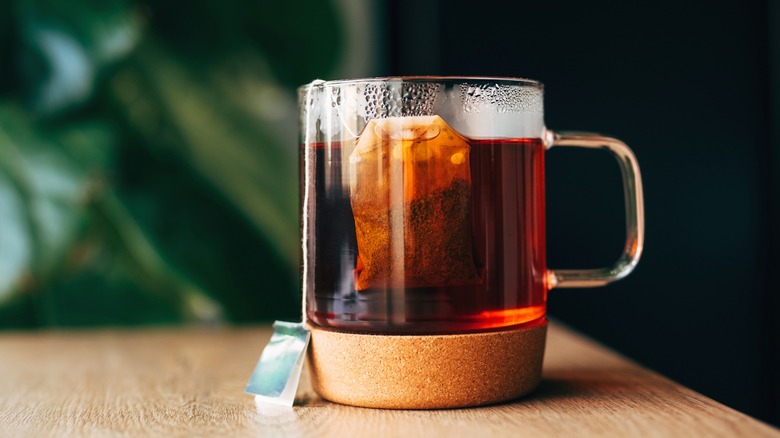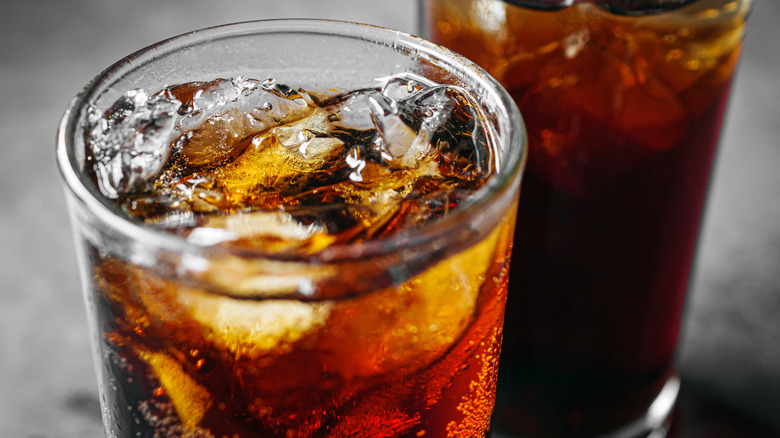For A Boost Of Hydration, Sip This Tea All Summer Instead Of Sodas
Staying adequately hydrated during the dog days of summer, or anytime for that matter, is essential if you want your body and mind operating at peak performance. Drinking plain water is obviously a great way to keep dehydration at bay, but let's face it, it doesn't exactly have your taste buds doing a happy dance. Tea is often considered an excellent alternative when you want some flavor in your beverage — but how much better is it than soda in terms of hydration?
According to Kara Lydon, RD, LDN, registered dietitian, intuitive eating counselor, and owner of Kara Lydon Nutrition and The Foodie Dietitian Blog, it all comes down to caffeine content. "Caffeine is a mild diuretic, which might lead to more fluid lost from urine output," she said. "Herbal teas are made by steeping dried flowers and leaves/roots of various plants with hot water, so essentially you're getting just as much hydration as plain water." While root beer typically doesn't contain caffeine, most other sodas serve as a subpar option when compared to some teas — especially hibiscus. "Since soda is made with water, it is hydrating; however, hibiscus tea is a more healthful choice for hydration since it doesn't contain any added sugar or caffeine," Lydon said.
The hydration benefits of drinking hibiscus tea don't end with a lack of sugar and caffeine. "Hibiscus is similar to other herbal teas in terms of its hydrating qualities, but it also boasts the antioxidant, anthocyanin, which is responsible for that gorgeous deep red hue," Lydon said. "Hibiscus is one of the best tea choices for hydration because not only is it an herbal tea (made from dried petals of the hibiscus flower), it also contains very small amounts of electrolytes like potassium, sodium, calcium, and magnesium."
Caffeine in moderation won't cancel your hydration
Plenty of foods can help boost hydration (Some fruit is even more hydrating than watermelon), but if you're depending on flavorful drinks to keep you from going dry, tea is the way to go. But while hibiscus may be the best option, other types do an adequate job as well. Kara Lydon emphasized that it all depends on how much caffeine is present. "The more caffeine a tea contains, the higher its diuretic effect," she said. "Black teas contain the most caffeine, followed by green tea, and then white tea."
Surprisingly, many sodas have less caffeine than black tea, but coffee is a different matter. Whether you should start your morning with coffee or tea is a matter of personal choice, but if you're eliminating caffeine from your diet as a means of staying hydrated, you might want to skip java early in the day. Even black tea has only half the amount of caffeine of your average cup of coffee. Still, that doesn't necessarily mean that consuming a cup of jolt juice or black tea in the morning will leave you parched the rest of the day.
"Most tea contains a modest amount of caffeine, between 20 to 50 milligrams per cup, on average, and research shows that mild to moderate caffeine consumption does not actually dehydrate you," Lydon said. "To have a significant diuretic effect, you'd need to consume approximately 500 milligrams of caffeine; about 10 cups of black tea." If you're only consuming caffeine in the morning — be it from tea, soda, or coffee — you don't need to be overly concerned about becoming dehydrated later, unless you are chugging loads of it before heading out into the world.

